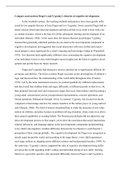Compare and contrast Piaget’s and Vygotsky’s theories of cognitive development.
In the twentieth century, the teaching methods and practices have been greatly influ-
enced by two popular theories of Jean Piaget and Lev Vygotsky. Swiss scientist Piaget had an
initial concern about individual development and believed that every child is born with a ba-
sic mental structure, which is the base for all the subsequent learning and development of an
individual (Damon, 1984). At the same time, the famous Russian psychologist Vygotsky
claimed that genetically inherited qualities do not stand as the most important component in
cognitive development and suggested that social interaction with more skilled and experi-
enced people is more significant for a child’s learning and knowledge (Tudge & Winterhoff,
1993). Two theorists held significantly different views concerning the cognitive development
of an individual, however, they both brought crucial insights into the field of cognitive devel-
opment and put the basis for future research.
Piaget and Vygotsky had distinctive motives and that led to significantly different ob-
servations and theories. The Swiss scientist Piaget was keen on the development of children’s
logic and discussed how the understanding of the world shifts throughout time (Youniss,
1978). Led by the latter mentioned concerns, he studied qualitatively different replacements
and discovered that children think and argue differently at different periods in their lives. He
then proposed four universal and consecutive stages that occur from infancy until becoming a
young adult: sensorimotor period, preoperational representations, concrete operations, and
formal operations (Mensah & Somuah, 2014). In contrast, Vygotsky was focused on the de-
velopment of knowledge and how the mature members of the culture pass it to young individ-
uals (Daniels, 2006). The field of interest stimulated him to study the inclusion of new infor-
mation on children, and place learners in problem-solving situations, where some were above
their natural capabilities or existing beliefs. The Russian psychologist did not adjust the cog-
nitive development process in four stages, yet he drew the conclusion that social interactions,
cultural influences, and language appear as the most important components predetermining
every child’s development. Another difference between the two theories is each theorist’s
perception of their concept globally. The cognitive development for Piaget was recognized as
mostly equal around the world, and according to his stage theory, every child experiences
each stage without no skipping across different cultures and backgrounds(Azmitia, 1988). At
the same time, Vygotsky’s theory supported the idea of cognitive development being differ-
ent across the world regarding child’s culture and individual timing of new skills’ forming.
Moreover, egocentric speech is also presented differently between Piaget’s and Vygotsky's
, theories. Piaget saw the egocentric speech- an act of a child speaking to himself - as a sign in-
dicating the lack of language and social skills. He claimed it as a pre-operational stage’ char-
acteristic and presumed it to remain until the child enters the sequent operational stage
(Lourenço, 2012). Yet, according to Vygotsky’s point of view, the egocentric speech was a
normal part of children’s cognitive development which is an important stage in the transition
from social to inner speech. It also can be used as a means for children to plan activities and
consequently assist their development.
However, Piaget and Vigotsky lived in a similar intellectual world and their theories
stand with few resembling points (Tudge & Rogoff, 1999). Firstly, both theorists shared the
belief that a child is active in the process of learning (Butterworth, 1982). Vygotsky’s theory
was based on a child’s development through his social world, and his general law of develop-
ment suggested that in the first place children become available for cognitive development
when they are active and interact with more experienced people: ”Any function in the child’s
development appears <…> on two planes. First, it appears on the social plane, and then on
the psychological plane” (Lloyd & Fernyhough, 1999, p. 34). On the contrary, the social in-
fluences were not central aspects to Piaget’s theory, and he only occasionally referred to this
topic, yet he also argued that “social life is a necessary condition for the development of
logic. We thus believe that social life transforms the individual’s very nature” (Lloyd & Fer-
nyhough, 1999, pp. 33). Furthermore, Piaget and Vygotsky both emphasized the significance
of mutual understanding between two people and its impact on cognitive development (Da-
mon & Killen, 1982). Piaget claimed that children’s connection with their peers is relevant
and more likely to influence cognitive development than the adult-child interaction, as peers
reach mutual understanding faster, and adults tend to cause young individuals to ignore their
ideas and lower self-esteem. His approach also covered a ‘must-have’ components in a rela-
tionship between two people, like having a common language, the reciprocity, and willing-
ness to accept each other’s different opinions. He especially highlighted the importance of
reciprocity and unsolicited cooperation in disagreement. Piaget noted it as a crucial moment
of communication, as it shows other individual’s standpoint and allows people to learn from a
partner by logically comparing two different perspectives (Lourenço, 2016). Vygotsky also
supported the idea of cooperation and stressed the importance of matching partners sharing
similar attitudes, although his theory suggested a different standpoint on the partner's roles
(Penuel & Wertsch, 1995). As his theory is based on the child’s interaction with MKO (More
Knowledgeable Other), a theorist assumed that a child is naturally more engaged to interact





